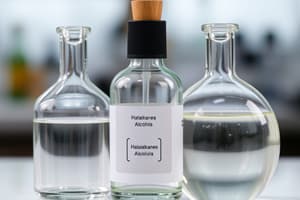Podcast
Questions and Answers
What is the purpose of antibumping granules in a round-bottom flask?
What is the purpose of antibumping granules in a round-bottom flask?
- To measure the boiling point of the organic product
- To increase the rate of reaction
- To produce smaller bubbles for gentler heating (correct)
- To separate liquids from their impurities
What happens to the vapour in a reflux process?
What happens to the vapour in a reflux process?
- It is mixed with the distillate
- It condenses and drips into the collecting flask (correct)
- It is measured by a thermometer
- It escapes into the air
What is the difference between reflux and distillation?
What is the difference between reflux and distillation?
- Reflux allows volatile components to escape, while distillation does not
- Reflux is used for primary alcohols, while distillation is used for secondary alcohols
- Reflux does not allow volatile components to escape, while distillation does (correct)
- Reflux is used for combustion reactions, while distillation is used for separation
Why is reflux used instead of just heating in a beaker?
Why is reflux used instead of just heating in a beaker?
What is the purpose of a thermometer in a distillation process?
What is the purpose of a thermometer in a distillation process?
What is formed when the boiling point of a liquid is reached during distillation?
What is formed when the boiling point of a liquid is reached during distillation?
Why are different alcohols separated through distillation?
Why are different alcohols separated through distillation?
What happens to tertiary alcohols during combustion?
What happens to tertiary alcohols during combustion?
What is the purpose of a Liebig condenser in a distillation process?
What is the purpose of a Liebig condenser in a distillation process?
What is the result of a combustion reaction of an alcohol?
What is the result of a combustion reaction of an alcohol?
Flashcards are hidden until you start studying




